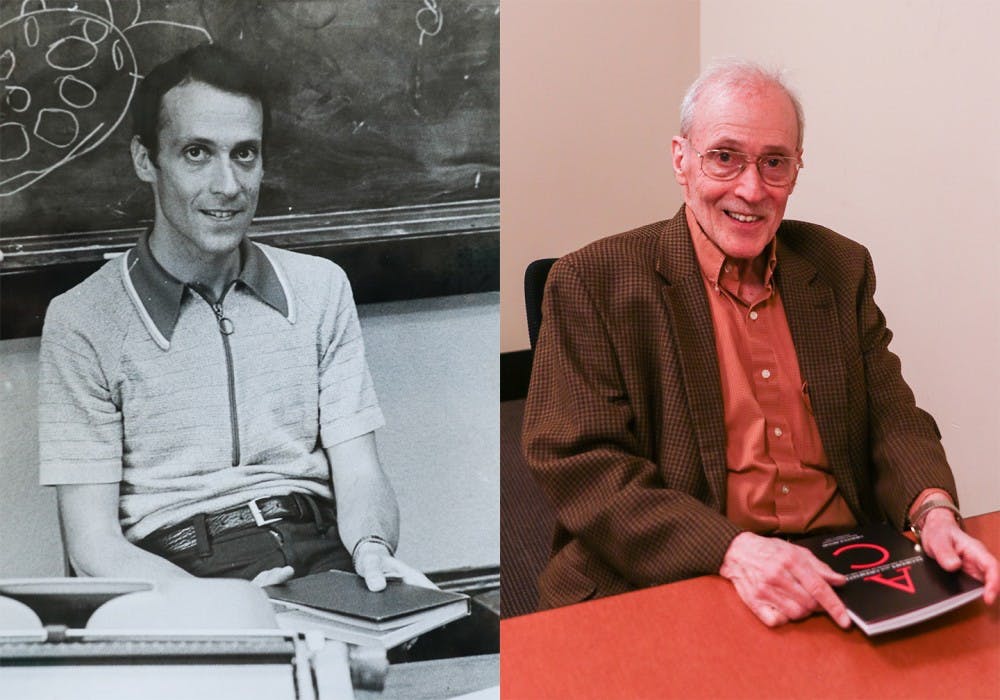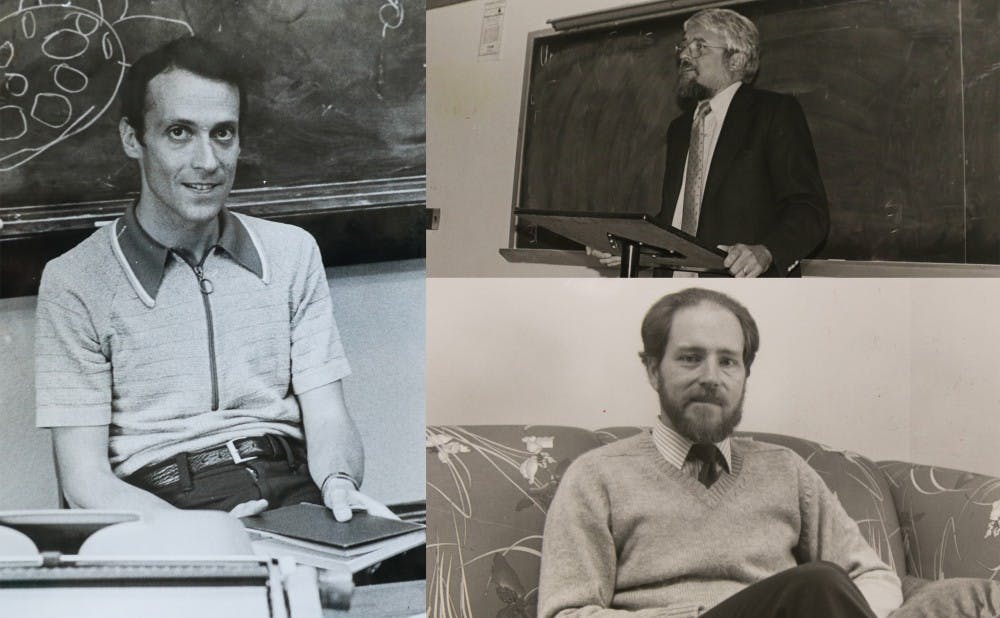For the fourth installment of the Dear Old Duke series, we focused on three of Duke's social scientists—political scientist Michael Gillespie and historians William Chafe and Seymour Mauskopf—as they talk about how their lives have changed since the original photographs. The first installment of the series featured an archaeologist couple, the second looked at four of Duke's deans and the third focused on two of Duke's biologists. The interviews are edited for length and clarity.
From writing a history of parapsychology to their child's first birthday party, here are the stories of three of Duke's social scientists.
Michael Gillespie
Michael Gillespie is a professor of political science and philosophy and the director of the Duke Program in American Values and Institutions. He has been at Duke since 1983. Gillespie talked about changes in his own life and the University since the original photo was taken in Nov. 1988—on the same couch. When the political science department moved from Perkins to Gross Hall a few years ago, he decided to take it with him.

Michael Gillespie: "My son was born in Nov. 1987, so he would have been just about one year old. His birthday party, we had a big piece of cardboard we put on the floor and chocolate cake and just let him crawl over and stick his face into it. I had discovered the joys of fatherhood, which much to my surprise were much greater than I ever imagined, and much harder than I ever thought. I was teaching what used to be called 'Political Ideologies' and is now called 'Left, Right and Center' and I was teaching a course on nihilism, which was the subject of a book I was writing then that was published in the early 1990's. And I taught a course called 'Ambition in Politics' and I got lots of athletes in there, so that year Danny Ferry was there who went on to play in the NBA and who went on to be a general manager. Yeah, so long ago and far away... he now has less hair than I do!"
The Chronicle: What are some things that have changed in your life since then?
MG: "Surprisingly, I don't actually feel much different than I did then, except I have tenure. Duke has become a different place than it was then. I think then our Asian population was about 1 percent, now it's about 17 percent. Academically, students were bright then and they are bright now. I think they were maybe a little more engaged in '88. That was just before the fall of the Berlin Wall and the collapse of the Soviet Union, so we were still worried about things like nuclear war... So America seems, in general, a much safer place to me now than it did then. Statistically we know that crime has vastly declined. Then until the mid-90's was the height of the drug wars and crime in the United States. I think Duke has become more administrative, and less faculty-driven. We have lots more administrators than we did then, and faculty play less of a role in making administrative decisions about things.
"I think students are more pre-professional than they were in those days, maybe in good reason after the variety of financial circumstances have changed that makes it more difficult to think that your future is certain. Students I think are more competitive, and students are way more involved in extracurricular activities. I think that is good in some senses, and it's partly our fault because in admissions we expect students to have done a whole bunch of things and we're surprised when they keep doing them. So I think students are probably a little less intellectual in that sense, and a little more activity-oriented—which is not necessarily a bad thing, but it's a difference.
"I think after more than 30 years marriage, you know, you learn how to adjust both your expectations and demands in life. And that relationships are really sustained by mutual effort over time. When we were first married, we were at a fiftieth wedding anniversary and a woman was asked if she was always as happy as she was today, and she said 'Well, I've had good decades and bad decades.' I thought, wow, you can think in terms of decades? But yeah, in retrospect, you can do that."
William Chafe
William Chafe has served in a variety of roles in his time at Duke—Alice M. Baldwin professor of history, chair of the department and dean of the Faculty of Arts and Sciences. He also served as president for the Organization of American Historians and was a co-founder of Duke's Center for Documentary Studies. He came to Duke in 1971 with fellow historian Larry Goodwyn. Chafe's research focuses on gender equality and race, and he talked about what had changed in his life since the original photo was taken in 1984.

William Chafe: "We came into a history department which was going through a fairly difficult stage because some of the people in history had been involved in demonstrations in '68 and '69—the vigil, the Allen Building takeover—and they had left. So [Goodwyn and I] came into a department that was somewhat chaotic and, for whatever reason, we had a degree of freedom that was probably unusual and could never happen today. Because within six months, Larry and I had started the oral history program, we had already gone out and raised a quarter million dollars from the Rockefeller foundation—which is about the equivalent of at least a million today—and we were recruiting black graduate students to do oral histories on the origins of the grassroots Civl Rights Movement.
"We started that by 1972, and within four or five years we were bringing in half the graduate students in history... We created an oral history program that was very, very important, and actually over time we graduated 45 Ph.D. students in our program—more than half of whom were black. And those students ended up publishing 28 books, 18 of which won National Book Prizes. They basically changed the entire historiography of the Civil Rights Movement. So by the mid-80's, basically, we were dominating the history department. Actually, by 1979 or 1980 we were doing that. It was a very, very amazing transformation that took place in history using oral histories, using social history, using grassroots activism.
"And that probably could never happen today, but it did happen then. And we were, in some ways, the centerpiece of the department. We were also very involved in recruiting not only black graduate students, but black faculty—and so our program was already making huge waves. My career, and this also could not happen today—I was promoted with tenure, from assistant professor to associate professor in two years...
"We were very lucky, in terms of when we came and the degree to which we had support from Terry Sanford. Terry actually sent us to China in 1980 to inaugurate what we hoped would be a relationship with the Chinese academy in which we would use oral history as a linkage, and they would be interested in doing an oral history of the Chinese Revolution and stuff like that.
"We then—Larry and I and two other people in history—became the pivotal force in fighting against the Nixon Library, which Terry was trying to bring to Duke. He wanted to do that in 1981, and we organized the faculty and defeated it by one vote. Terry, who had been our chief ally, became our foe for a period of time. But anyway, that helped to create a different circumstance with a whole lot more empowerment of the faculty, with the Academic Council...
"The bottom line is that it has been an incredibly interesting and productive period of time. I turned down three, four, five different chances to leave Duke and I always wonder if I should. In retrospect, I would simply say I'm so glad I didn't because I could then see the seeds we planted come to fruition."
Seymour Mauskopf
Seymour Mauskopf is a professor emeritus of history whose research has been focused on the history of science. For a ten-year stint—including the time in which the original photo was taken—he studied the history of parapsychology. Now, he teaches part-time and is finishing up a book on Alfred Nobel and his rivals over the discovery of munitions.

Seymour Mauskopf: "Let's see, October 1977, I had been married about 13 years at that point and had about three children... My wife was working, she would be going back to do a Ph.D. very shortly. I was, by that time, an associate professor at Duke in the department of history and was teaching the history of science. My major area of research was, and is in recent decades, the history of chemistry.
"But for ten years—and that went from about 1970 to 1979—my colleague at UNC in the history of science, Michael McVaugh, and I researched and wrote a history of parapsychology. We got into that in part because when we came to Duke and UNC from Princeton, where we got our Ph.D.s in 1964, the thing Duke was most famous for to the outside world was parapsychology, and I was intrigued by the hostility I encountered towards this—sometimes quiet and truculent, sometimes more blazing forth. As a historian of science, I have no particular feeling for it—either positively or negatively—and I was just intrigued that there was such hostility...
The Chronicle: What has changed in your life since then?
SM: "The kids have grown up. They all went to college, they're all launched professionally. My eldest is 51 years old now. We have eight grandchildren. My wife is still working and I'm teaching part-time. I have 24 students enrolled in my class, which I'm very pleased with. So life is very good."
Get The Chronicle straight to your inbox
Signup for our weekly newsletter. Cancel at any time.
Bre is a senior political science major from South Carolina, and she is the current video editor, special projects editor and recruitment chair for The Chronicle. She is also an associate photography editor and an investigations editor. Previously, she was the editor-in-chief and local and national news department head.
Twitter: @brebradham
Email: breanna.bradham@duke.edu

